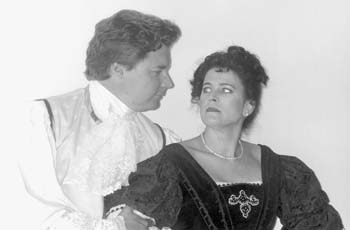![[MetroActive Stage]](/stage/gifs/stage468.gif)
[ Stage Index | Santa Cruz Week | MetroActive Central | Archives ]
Light Tragedy
Despite good details, Bay City Opera's 'Don Giovanni' lacks depth
By Scott MacClelland
FROM THE LOOKS of the program handout, Karole Lewis loves opera not wisely but too well. The general director, major contributor, secretary and treasurer of the Santa Cruz Bay City Opera was its stage director for the just-concluded run of Wolfgang Mozart's Don Giovanni. She also designed the costumes, worked wardrobe, co-managed properties, handled publicity, designed the program book and gives herself credit for the English translation of the libretto. Did I mention that she also cast herself as Donna Elvira in these performances at Cabrillo College?
Is there a price to pay for such a jack of all trades? Yes. This Don Giovanni found its pace somewhere between soap opera and hysteria, affording no one any real opportunity to develop credible character. Mozart himself nearly got pushed out.
But even if last Saturday's performance lacked such expressive essentials as nuance, subtlety and refinement, it did somehow stitch itself together with a determined momentum and various accidental charms. The costuming changed progressively and logically, the sets and lighting, spare as they were, served well. Conductor Stephen Tosh's mini-orchestra of strings, winds and percussion acquitted itself nicely--suffering only the indignity of having to be heard with his phony-sounding synthesizer. (What a missed opportunity to use a spinet or fortepiano, either of which would have improved, rather than degraded, the result.)
Moreover, talent did reveal itself. As Leporello, James Brown sported a naturally rich and powerful bass-baritone, even while in need of coaching to fulfill its promise. As Donna Anna, Wendy Hartman-Carr displayed a seasoned dramatic soprano and genuine expressive character on the voice. (Conductor Tosh unfortunately tended to rush impatiently ahead of her phrasing.) As the Commendatore, basso Andrew Brumano delivered one of those fabulously smoky tones that one waits decades to hear.
In the title role, Joseph Haselton certainly cavorted about, but couldn't seem to decide if his character was aristocrat or clown. His vocalizing didn't help. While there is evidence of promise, the vocal production was erratic and suffered a nervous vibrato on sustained tones. His patter scenes worked best. Gina Silverman's Zerlina fared more or less the same, but with a much smaller, nasally production that needs serious professional help.
For singers of their relative youth, both Peter and Karole Lewis seem surprisingly beyond their vocal prime. As Don Ottavio, Peter's lyric tenor was narrow, cautious, even fragile. His production and focus were more exercise than performance. (To give the role its due, the character of Ottavio is all exercise and no performance anyway.) Karole's soprano has gained consistency but the vibrato has grown noticeably loose. As a character, her Elvira was stuck in one dimension.
While local opera keeps springing up, it somehow promotes as many weeds as flowers. One might wish that local producers hit on some single-minded protocol, something that assigns highest priority to dramatic impact, for example, or--dare I say it--vocal production. We've heard those singers who consistently drop diaphragmatic support hotly defend their skills at diaphragmatic support. We've heard singers whose achievements were compromised by deafness, literally. Why produce an opera when you can more easily be one?
If vocal quality isn't a prerequisite for opera, then what is? I may be wrong, but I always thought that trained singing was what separates opera from all the other performing arts. Santa Cruz Bay City Opera has announced plans to stage Madama Butterfly in January. We hope the company's leadership steps back for a thoughtfully circumspect moment before mounting the production. Nothing can turn tragedy into comedy more easily or quickly than ineptly performed opera.
Copyright © Metro Publishing Inc. Maintained by Boulevards New Media.
![]()

Sidelong Glances: Tenor Joseph Haselton and Karole Lewis star in 'Don Giovanni' at Bay City Opera.
From the September 22-29, 1999 issue of Metro Santa Cruz.